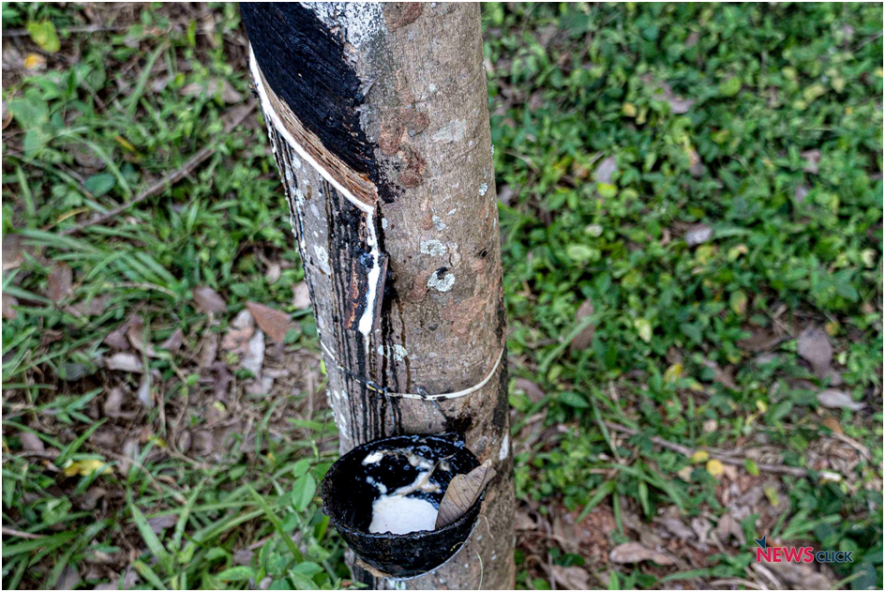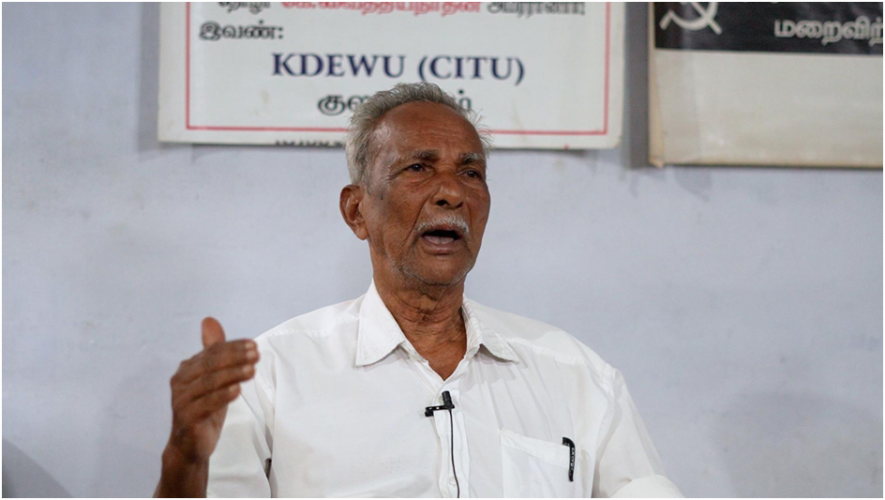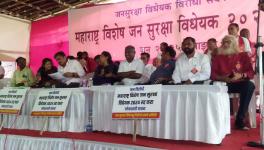Rubber Plantations Losing Sheen in Kanyakumari, Trade Union Seek Govt Attention

The history of rubber plantations in Kanyakumari dates back to more than a century ago. John Joseph Murphy, an Irish man, is revered for introducing rubber plantations in the Kottayam district of Kerala during 1902, which was then part of the Travancore princely state.
Kanyakumari, then a part of Travancore, was a beneficiary of the introduction of rubber plantations, thanks to its proximity to the western ghats. Now, with the plantations spreading across 1 lakh hectares (ha) across the hills and plains in the district, around 3 lakh people are employed directly and indirectly.
The trade unions have played a vital role in winning the workers' rights since the formation of the All Travancore Estate Workers Union, the first union for rubber plantation workers in the year 1942. The unions have held historical struggles to ensure the workers get fair wages, permanent jobs and social welfare measures.
While the union government policies on relaxing import norms have led to a fall in prices, the state government's attitude towards the public sector company Arasu Rubber Corporation (ARC) has reduced plantation area, employment and revenue.
In small and medium plantations, both the owners and workers are affected due to the reducing prices of the rubber due to the relaxation of imports by the union government.
FIGHTING FOR RIGHTS SINCE 1942
Many of the estates before independence were owned and managed by the British, during which the workers were subject to humongous exploitations.
The workers were put to untold hardships from unregulated working hours, deplorable working conditions, lack of medical facilities and wages. There is no data on the number of workers who died of accidents, contagious diseases and snake bites during the pre-independence period.
The leaders of the communist-socialist organisations took the initiative in organising the estate workers. “GS Mani, a member of the first branch of the communist party of India (CPI) in the Kanyakumari district, managed to form the union for workers in SIvalogam estate in 1942 under the banner of All Travancore Estate Workers Union,” said M Annadurai, president of the Kanyakumari District Estate Workers Union affiliated to the Centre of Indian Trade Unions (CITU).
The rubber plantations expanded from Vilavancode taluk in the western part of Kanyakumari to Thovalai taluk, adjoining the western ghats. A union was started in this area as well but functioned independently.

After being tapped, latex is collected, usually in coconut shells or plastic bowls. The workers later contain all the latex for the next stage of processing.
After the formation of linguistic states in 1956, the two unions were merged, leading to the formation of the Kanyakumari district estate workers union (KDEWU) in 1958. The union was then affiliated with the All India Trade Union Congress (AITUC).
The CITU, since the late 1970’s have led protests and strikes for better working conditions, working hours, permanent jobs and social welfare measures.
“One of the most important movements in private estates was the workers' strike in Ambadi estate in 1972-73. An indefinite hunger strike was led by late J Hemachandran, former CITU state president and former CPI(M) MLA. It went on for seven days, after which the demands were accepted. A strike for dearness allowance was held in 1979 as well. Only due to sustained struggles, the estate workers have won several benefits,” Annadurai added.
The daily wage of estate workers is Rs 535 excluding other benefits, one of the highest in the country for rubber plantation workers.
FORMATION OF GOVT PLANTATIONS
Considering the increasing demand for employment of both the educated and uneducated population of Kanyakumari district, the trade union demanded the state government establish a public sector rubber plantation company. Since then, the private owners, earlier the British and later by individuals belonging to Kerala, were owning the plantations.
The KDEWU and CPI decided to hold a padayatra of almost 40 km from Kadayalumoodu to Nagercoil, the district capital, to emphasise the need to establish a government-run rubber plantation in 1962.
“The union selected 20 workers from the union for the padayatra. They met the district collector to submit the memorandum demanding a public sector rubber plantation. The CPI leaders led by P Ramamurthi met the chief minister K Kamaraj in the secretariat to insist on the demand,” said M Valsa Kumar, general secretary of KDEWU.

R Velukutty, 71 years old now, is the only surviving member of the 20 workers who took out the padayatra demanding government rubber plantation.
After much perusal, the government of Tamil Nadu constituted the government rubber plantation (GRC) in around 5000 ha. In the 1960s, the area of rubber plantations owned by individuals increased as many shifted from coconuts and other crops.
“When I started working as a rubber tapper in 1964, we had to tap 280 trees every day, collect and filter the latex. We were paid a wage of Rs 2.01 paise for all our work. Only after the formation of trade unions in private estates, the working conditions and wages improved,” said R Velukutty, presently the vice president of KDEWU.
A 134-day long strike on demand for a bonus for the GRC workers was led by the CITU in 1984. “Since GRC was not a corporation, the workers were denied bonuses for years. After the prolonged struggle led by CITU, the GRC was converted to a corporation and was named as ARC,” Annadurai said.
The spurt in rubber plantations helped increase the district's economy as the quality was second to none. The exports improved over time, leading to further increase in the plantation area.
“The western part of Kanyakumari was once known as Kuwait since the income in this region was high for small and medium planters. Now, after implementing the private forests act and increasing imports of rubber-based products, the price has fallen steeply,” Valsa Kumar said.
CONTINUOUS SETBACKS AFFECTING WORKERS AND GROWERS
Since the rubber plantations are confined to only the Kanyakumari district, the trade union leaders allege negligence from the government of Tamil Nadu. The ARC has handed over around 500 ha of land back to the forest department on claims of the rubber trees being unproductive, and the CITU alleges negligence from officials.
The relaxation of norms for importing rubber-based products has also affected the industry, “The private forest act implementation has affected the rubber plantations. Most people own around 5 cents to 50 cents of land with rubber. Due to the act's implementation, they are unable to slaughter the unproductive trees, sell or mortgage the property for essential needs,” Valsa Kumar said.
The private estates exploit the workers by snatching away their hard-earned rights considering the reducing demand. “The agreement on wages and other benefits apply to estates where trade unions are active. In other estates, the workers continue to face issues including permanent jobs, medical treatment facilities, gratuity, provident fund and employees state insurance (ESI),” Valsa Kumar accused.
The workers in private estates continue to lose jobs demanding fair wages and job security. The CITU leaders also allege the labour department officials of playing second fiddle to the estate owners.
“The moment we file a complaint with the department on a labour dispute, the officials in the labour department convey the message to the concerned estate owner. In a recent instance, a reconciliation officer said that he could not instruct the estate owners to re-employ a terminated worker. This situation should change,” Valsa Kumar said.
Due to the changing policies, the workers who depend on the plantations are affected the most. Since employment opportunities are far and few, the rubber plantation being crucial to the district needs the immediate attention of both the state and union governments and stringent regulatory measures on the private estates.
Get the latest reports & analysis with people's perspective on Protests, movements & deep analytical videos, discussions of the current affairs in your Telegram app. Subscribe to NewsClick's Telegram channel & get Real-Time updates on stories, as they get published on our website.
























